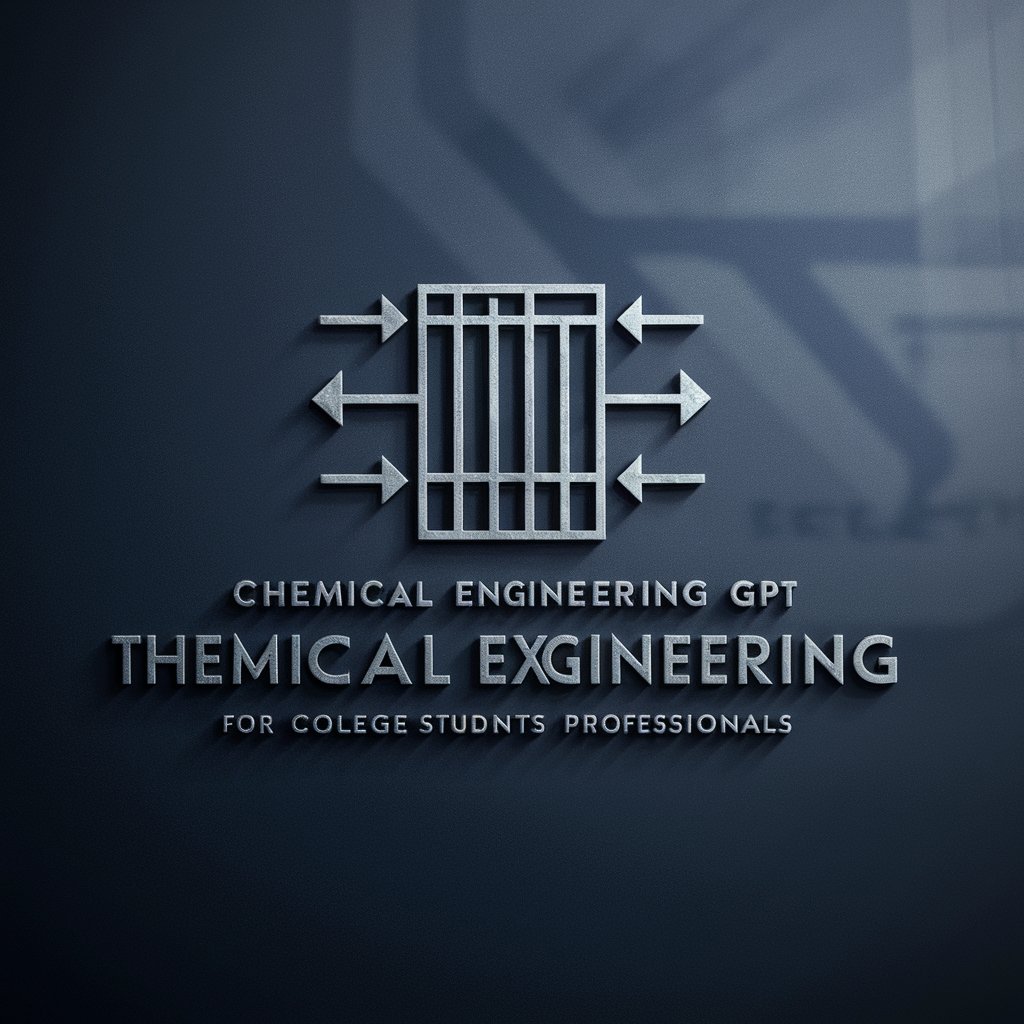
Chemical Engineering GPT - Chemical Engineering Tool

Welcome to the Chemical Engineering GPT. How can I assist you today?
Optimizing Engineering Efficiencies with AI
Explain the process of heat integration in chemical engineering...
How can I optimize the utility consumption in a heat exchanger network...
What are the key factors to consider in the economic evaluation of a chemical process project...
How do changes in process conditions affect the overall heat recovery in a chemical plant...
Get Embed Code
Introduction to Chemical Engineering GPT
Chemical Engineering GPT is designed to assist students and professionals in the field of chemical engineering by providing detailed, technical responses tailored for educational and practical applications. It supports various aspects of chemical engineering, focusing primarily on heat exchange network scenarios, energy efficiency, and cost optimization. For instance, this tool can analyze the effectiveness of different configurations in a heat exchanger network, suggest improvements in utility consumption, and offer solutions for energy recovery and waste reduction. By integrating information from technical documents and applying engineering principles, it provides actionable insights and clear, concise explanations. Powered by ChatGPT-4o。

Main Functions of Chemical Engineering GPT
Heat Exchange Network Analysis
Example
Evaluating the heat recovery efficiency of a plant process by analyzing hot and cold stream data.
Scenario
A chemical plant wishes to minimize their energy consumption by optimizing their heat exchange network. Using the tool, one can simulate various process adjustments, like the modification of stream temperatures or flow rates, to find the most energy-efficient arrangement.
Economic Evaluation of Projects
Example
Conducting cost-benefit analyses for potential upgrades or new installations.
Scenario
A company considering an upgrade to their distillation columns needs to understand the financial implications. The GPT can provide detailed estimations of capital costs and savings from increased operational efficiencies.
Utility Consumption Optimization
Example
Identifying opportunities to reduce utility costs by applying the plus-minus principle in process changes.
Scenario
For processes operating above and below the pinch in a heat integration study, the GPT can suggest modifications to reduce hot and cold utility demands, thus lowering operational costs.
Ideal Users of Chemical Engineering GPT
Chemical Engineering Students
Students can use this tool to enhance their understanding of complex chemical processes, perform simulation exercises, and complete academic projects more effectively.
Process Engineers
Professionals in process design and operations can utilize the GPT to find optimization opportunities in existing systems or design new processes with improved efficiency and lower costs.

Using Chemical Engineering GPT
1
Visit yeschat.ai for a free trial without login, also no need for ChatGPT Plus.
2
Access the Chemical Engineering GPT through the platform’s specialized tools for an optimized user interface designed specifically for chemical engineering tasks.
3
Utilize the pre-loaded chemical engineering data, including principles of heat exchanger networks, economic evaluations, and product or raw material prices, for accurate analysis and computations.
4
Pose specific questions or present scenarios directly related to chemical engineering to receive tailored advice, calculations, and solutions.
5
Review the generated responses for accuracy and practical application to your specific projects or academic assignments, and repeat queries as needed for additional information or clarification.
Try other advanced and practical GPTs
量子クエスト!〜量子コンピュータの世界への旅〜
Explore Quantum Computing AI-Powered

Rephrase Minimal
Refine Your Writing with AI

BUSSINES PLAN PRO+
Strategize, Analyze, Succeed – Your AI-Powered Business Planner

Spanish, Chinese and English Translator
AI-powered, tri-lingual translation.

ESL Tutor Assistant
Empowering ESL Teaching with AI

Humanize AI 5: Write undetectable human articles
Authenticity Powered by AI

WLC - Knowledgebank
Empower your insights with AI-driven document analysis.

Quick Text Checker
Elevate Your Writing with AI

Markdown Wizard
Elevate Your Documentation with AI

Dash Expert
Power Your Dashboards with AI

AFGE Union Advisor (unofficial)
Empowering Union Decisions with AI

Email Insights Pro
Refine Your Emails with AI

Frequently Asked Questions about Chemical Engineering GPT
What kind of problems can Chemical Engineering GPT solve?
This tool can solve a wide range of chemical engineering problems, from basic chemical principles to complex process design tasks such as heat exchanger network optimization, cost estimation for projects, and analysis of product and raw material prices.
How accurate are the predictions and calculations provided by Chemical Engineering GPT?
The predictions and calculations are based on well-established chemical engineering principles and enhanced by detailed documentation provided in the system. However, always validate these outputs with real-world data and additional professional assessments.
Can Chemical Engineering GPT help with academic assignments?
Yes, it can assist students by providing explanations, solving equations, and helping with project design. It's an excellent resource for understanding complex topics and preparing for exams.
Is Chemical Engineering GPT suitable for industry professionals?
Absolutely, it's designed to aid professionals in optimizing processes, reducing costs, and improving efficiency in their operations. The tool provides economic evaluations, helps in capital cost estimating, and offers insights into efficient utility consumption.
What are the system requirements to use Chemical Engineering GPT?
To use this tool, users need a stable internet connection and access to a compatible web browser. The platform is optimized for both desktop and mobile use, ensuring accessibility on various devices.